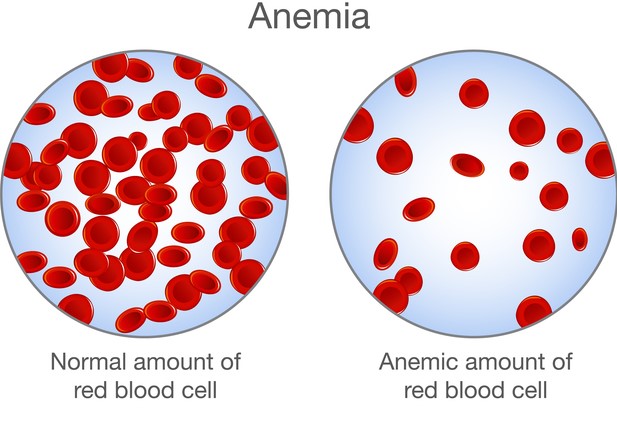Obesity Increases the Risk of Iron Deficiency Anemia

Obesity increases the risk of Iron deficiency anemia
Obesity and iron deficiency anemia appear to be unrelated. But according to studies, there is an increased risk of iron deficiency among people with obesity. Researchers(Cepeda-Lopez AC1, Aeberli I, Zimmermann MB., 2011), say that an obese person is likely to get anemia because of:
- Impaired iron absorption,
- Low levels of iron in the circulating blood,
- Poor dietary iron intake, and
- Increased iron requirements,
The study found that the higher levels of Hepcidin observed in obese individuals reduces their rate of iron absorption.
Bariatric patients are also at risk of anemia
Even after surgery, you are still at risk of anemia as your body cannot absorb iron properly. A study conducted by Dr Dan Eisenberg and team, and published in the Jama surgery journal found that poor iron absorption is the main cause of anemia among bariatric patients.
If you are a teen, or a woman who in the reproductive age, you have a higher risk of getting anemia. Additionally, if you suffer from obesity related chronic inflammation, your chances of iron deficiency anemia are higher. Moreover, ulcers that sometimes develop after surgery might bleed severely and cause you to be anemic.
However, the study also found that patients who received adequate follow-up care from a physician with bariatric expertise are less at risk. As such, once you have gone through weight loss surgery, it is important to see your surgeon and dietitian.
Importance of iron in the body
Iron helps you to maintain healthy cells, skin, hair and nails. When you eat food, iron is absorbed into your body through the cells that line the gastrointestinal tract.

(Miller-Keane Encyclopedia and Dictionary of Medicine, Nursing, and Allied Health, © 2003)
The iron is then released into your blood stream. Transferrin (a protein) then attaches to it and delivers it to your liver. Once there, your liver stores it as ferritin and releases it as the body needs to make new red blood cells.
Your body produces Red blood cells in the bone marrow with the help of erythropoietin, which is a hormone produced by the kidneys. Red blood cells contain hemoglobin which carry oxygen to body tissues. After approximately 120 days, your spleen reabsorbs red blood cells. More so, your body recycles iron from old cells. (American Society of Hematology, 2014).
For a proper diagnosis of iron deficiency, you need a complete blood count (CBC). If you have iron deficiency, your blood tests would show the following:
- Decreased hemoglobin and hematocrit
- Increased transferrin or total iron binding capacity (TIBC)
- Decreased ferritin
- Low levels of MCV (mean cellular volume)
- Decreased serum iron
- Decreased iron saturation
Further, your tests might show decreased white blood cell count if you have severe iron deficiency. More so, you might register a decrease/increase in platelete count.
Symptoms of Anemia
Anemia is a decrease in the number of red blood cells or alteration in the function of red blood cells. As a result, you will have inadequate oxygen delivery to the tissues.
The image below shows symptoms of anemia

Other likely symptoms include:
- Headaches
- Sore or smooth tongue
- Cravings for non-food items such as clay or ice
- Pounding in the ears
- Brittle nails
- hair loss.
- Cold feet and hands
Treatment of anemia

Treatment of anemia depends on the underlying cause and severity.
- First of all, if anemia is the result of an underlying disease such as an autoimmune disorder, the primary disease must be treated.
- As well, Increase iron intake through diet and iron supplements. If you have severe iron deficiency, you might need intravenous iron or blood transfusions.
- Finally, prevent nutritional deficiencies by doing the following:
- Eat foods high in hem-iron, such as red meats, white meats and fish.
- Eat foods high in non-hem iron such as leafy green vegetables, legumes, rice, grains and cereals.
Note:
- Supplementation should be closely supervised by your doctor to minimize risk of interaction with other supplements and drugs.
- You might experience side effects after taking iron supplements, intravenous iron or after blood transfusions.
- Some foods decrease iron absorption. Consequently, taking tea, coffee, milk and soda might contribute to anemia and you should therefore avoid these foods.
- Most of all, take foods that increase iron absorption, such as foods high in vitamin C.
References:
Gao Linda Chen, MD; Eric Kubat, MD; Dan Eisenberg, MD, MS, (2018).Prevalence of Anemia 10 Years After Roux-en-Y Gastric Bypass in a Single Veterans Affairs Medical Center
Ana C. Cepeda-Lopez, Isabelle Aeberli , Michael B. Zimmermann(October 2010) Article in International Journal for Vitamin and Nutrition Research ·
University of Rochester Medical Center. https://www.urmc.rochester.edu/encyclopedia/content.aspx?contenttypeid=134&contentid=159
American Society of Hematology. (2014, February 23). Iron Deficiency Anemia. American society of Hematology, 1-4.
Anemia.org. (2009). Avoiding Anemia and Nutritional Deficiencies Following Bariatric Surgery. Anemia.org.
Berkowitz, A. (2007). The Hematologic System. In Clinical Pathophysiology (pp. 118-125). Miami, Florida: medmaster, Inc.












